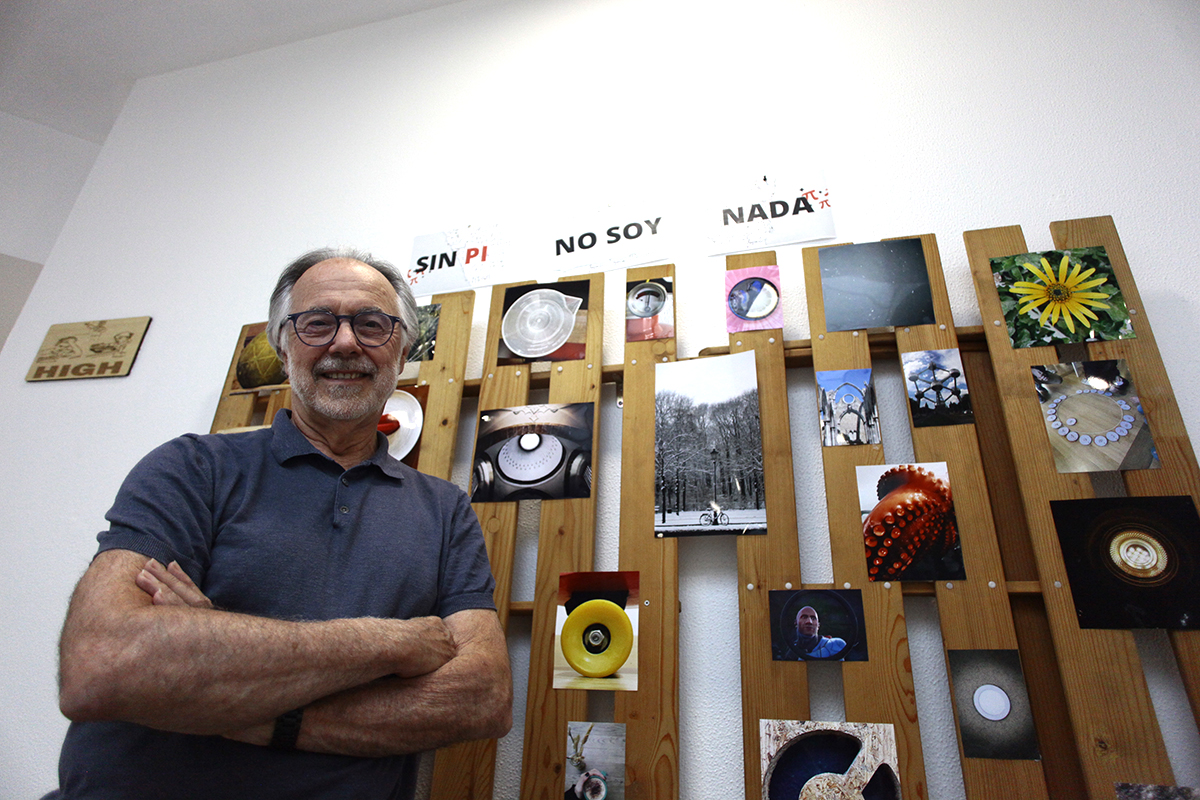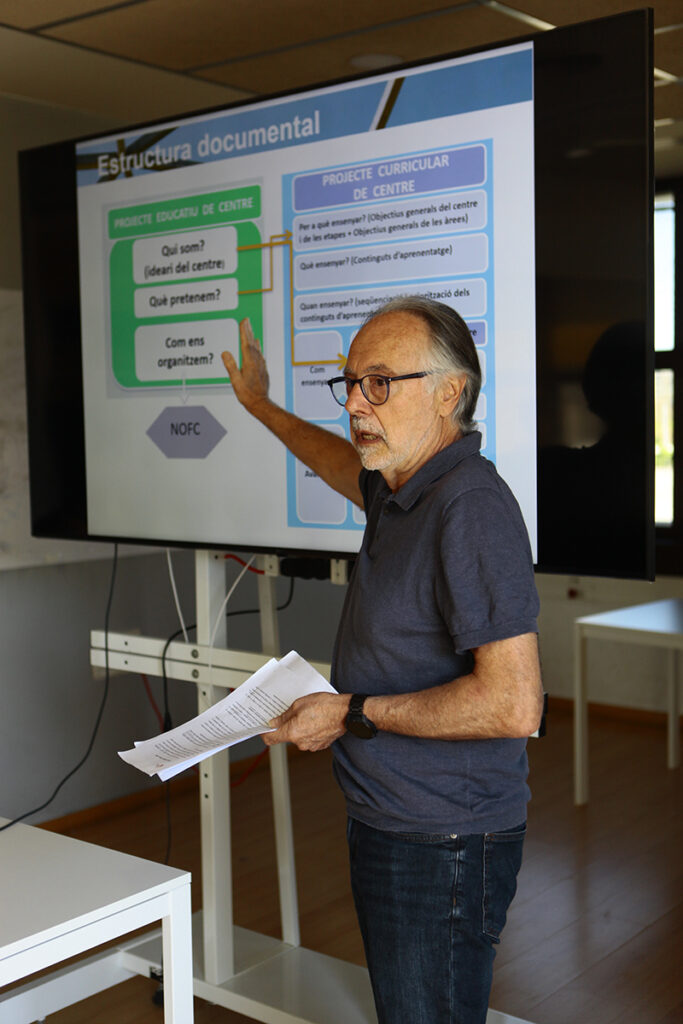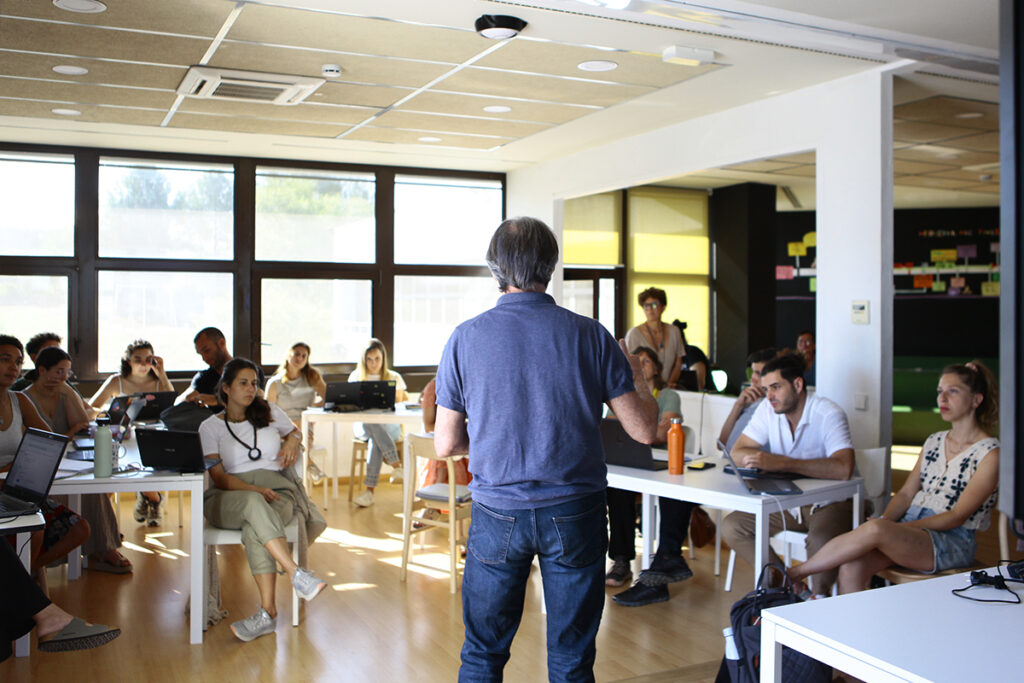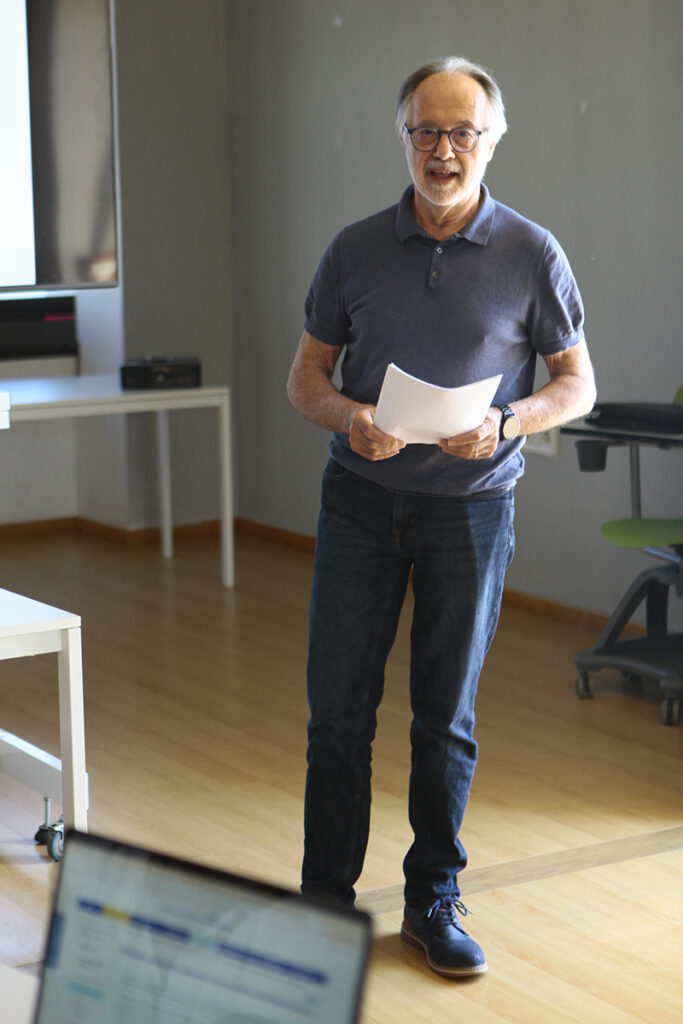
09 Jul Interview with Antoni Zabala, pedagogue: “We need to provide solutions to life’s problems”
With decades of experience in the field of education, Antoni Zabala i Vidiella is a significant figure in the world of pedagogy in Catalonia. His extensive career includes directing the Institut de Recursos i Investigació per a la Formació (IRIF), founding the magazine Guix. Element d’Acció Educativa, and directing the publication AULA de Innovación Educativa.
In addition to advising the Generalitat of Catalonia and other autonomous communities, the Ministry of Education, and the Government of Andorra on training plans and curriculum designs, he has also collaborated with numerous educational administrations and entities in Latin America.
This pedagogue, an expert in basic competencies and the author of nine education books, has been at CreaNova School to conduct a training session on project-based learning.
Subsequently, we spoke with him about the changes in education and how to focus programs on the Learning by Doing system.
– It is often said that education is outdated in relation to what society needs. Is that so?
– We see several transformations in the global educational process. And like any process, there is a crisis because we are moving away from a model based on propaedeutic training, where the goal is to move from one level to the next, from first to second, from second to third, and so on; and what I have learned is not as important. It is a selective system, designed not so much with the school’s objectives in mind, but with what will be required for university entrance exams.

Zabala during the training. Photo by JPChM
– And what about what society demands from the student?
– We come from that model, which believed that mechanically memorizing would lead to success. And that is a mistake because if I want to use knowledge to respond to the world, I have to learn what makes sense, not what doesn’t make sense.
But that model is changing based on what the school should be, which is not just preparing university students, but a society that aims to be democratic requires that the entire society be educated, whether they go to university or not.
– What would that change look like?
– In that change, we must address the problems that life will pose, not only in the professional and academic fields but also in the interpersonal or social ones. Content changes, new things are added. It’s no longer enough to know Boyle-Mariotte’s formula but to understand why it’s useful, to comprehend what happens with gases.
Another change concerns knowledge and how two people learn. Here, the different characteristics of each person must be considered, so meaningful and functional learning must be promoted. It’s about creating models for constructing knowledge. Mechanical repetition is useless to me; I need to understand it, and that involves a personal construction because we know that each person builds knowledge from their socio-cultural context, with their cognitive abilities, etc.
– This model change is like a paradigm shift from the Sophist method to the Socratic method, which you have referred to before. How would this analogy work?
– In the 5th century BC, the Sophists said, ‘I have the knowledge, and you as a student have to reproduce what I tell you.’ In contrast, Socrates argued that I have to help you learn through maieutics, that is, the Socratic dialogue, where you must ask questions, and through them, with dialogue, you build knowledge.

Zabala conducted a training session with the teachers of CreaNova School. Photo by JPChM
– So, it’s an exchange between teachers and students.
– Obviously, the knowledge we have now is based on the Socratic model, which is appropriate, and which we have when we open the door to ask why things happen.
Of course, there is also a methodological change; I can no longer use classrooms with 40 students where I tell a story and you learn. It’s a complex process that leads us to the personalization of learning, providing each student with the means to build from their possibilities, cognitive abilities, and cultural environment. This involves identifying each student’s needs.
– The key to this would be small groups…
– Of course, ideally, as a teacher, I can get to know each of the students based on their characteristics. And obviously, if there are fewer students in a class, it’s easier.
Let’s remember that the scientific knowledge we have now is the same as in medicine when it was concluded that there are no diseases, only patients, and each one needs a different treatment.
In education, we know that the learning process involves personalized attention. The advantage we have is that students learn more from their peers than from the teacher-student relationship.
– And why is that?
– Because peer learning generates a curiosity in the classroom, and it’s easier for students to seek learning when they interact with each other rather than one-on-one with the teacher.
– It’s like the philosophy of CreaNova School, which is ‘learning by doing’.
– Obviously, when we talk about the ‘learning by doing’ system, it’s because we learn when we do things, when we face problems. And that’s the motto, although the most appropriate might be ‘learning by doing for thinking’, because doing is for constructing knowledge. In other words, knowledge is not transferred without a prior construction process.
– What are the differential values of CreaNova School to promote this approach?
– One of the advantages of CreaNova School, since its inception, is providing each student with what they need while they are doing things. For this, it’s necessary to have small groups, from 15 to 20 students per class. But the important thing is not just that the groups are small, but to facilitate dialogues, observations, and reflections among them, so they can build knowledge together.

Zabala is the author of 9 books about education. Photo by JPChM
– When talking about personalization, it is said that it doesn’t matter if a student becomes a doctor or an engineer in the future, but that they are happy while learning.
– One of the foundations of CreaNova School is basing actions on scientific grounding. Of course, we want a doctor or an engineer to be happy because happiness in itself is not a goal but a means. In other words, I can’t learn well if I am not happy.
– It’s a completely different concept from those old methods, where cold showers were considered correct to make one strong and able to face society.
– Of course, it’s not about preparing strong people to be entrepreneurs and solve problems. We will train them through happiness. For example, an athlete, a soccer player, has to work hard, meditate, but they also train through “rondos,” a fun way to learn to move the ball, to change the position of the foot. These are exercises where they have fun. And they earn a lot!
So, in school, we have to do practice activities because they are necessary to show that effort is worthwhile. And also, in a playful way, where the game is not the goal but the means to practice, making the learning process more enjoyable.

